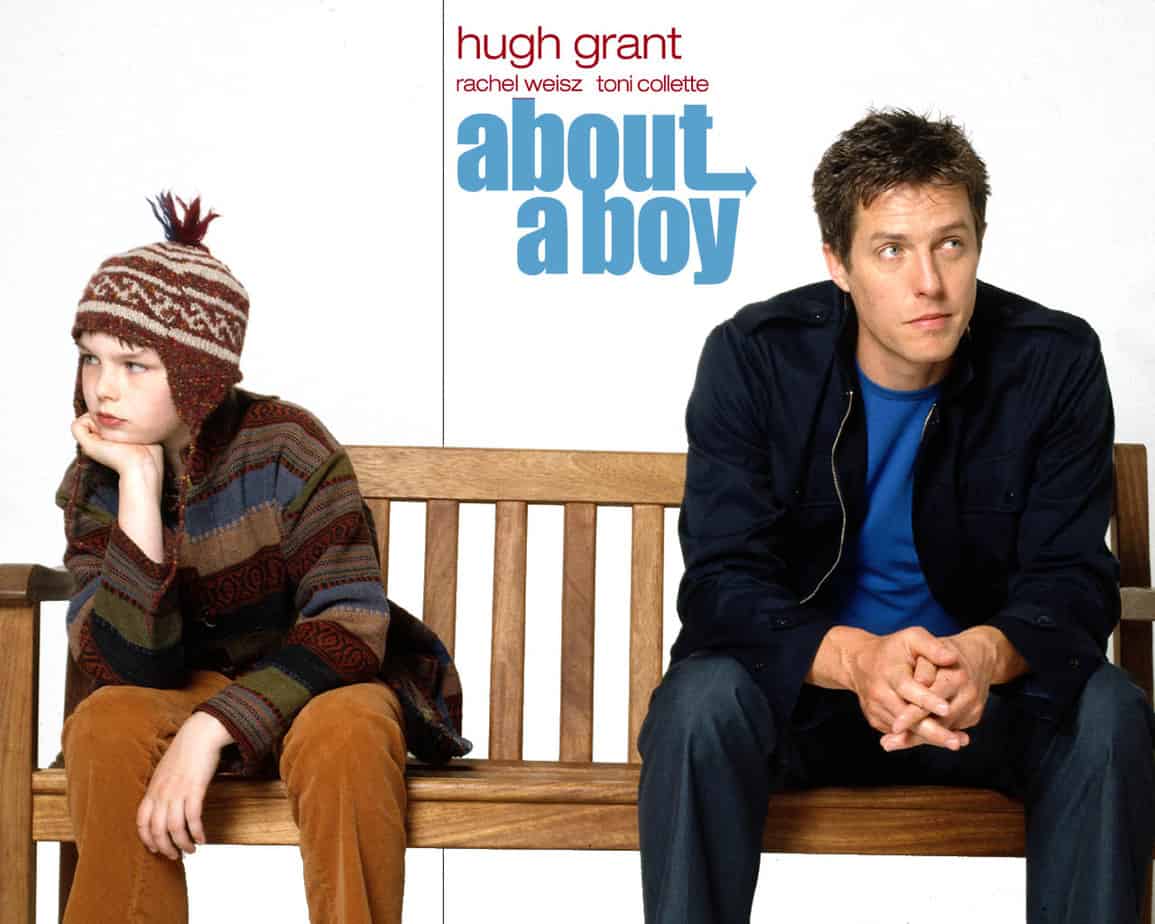About A Boy is a 2002 British transgression comedy based on a Nick Hornby novel of the same name. In its own way, About A Boy is also a kind of buddy comedy, though the buddies are vastly different in age. The book was intended for adult readers but the success of the film and the age of the main character has meant that it has become popular among young adults.
This film, based on the novel by Nick Hornby, is interesting because it is a rom-com that falls under the category of ‘Man Child Learns To Grow Up’, also known as a ‘Peter Pen and Wendy’ story or a ‘Bromantic Comedy’. These films are linked to names such as Gerard Butler and Judd Apatow, and I generally hate them. But I do love About A Boy. This is probably because the overriding genre of this film is neither romance nor comedy, but drama, which can be the magical ingredient in an otherwise problematic genre blend.
About A Boy is a great example of a ‘Transgression Comedy’, also known as the ‘Imposter Story’ — in itself a subcategory of the ‘Secrets & Lies’ story, in which the hero pretends to be someone they are not. The mask is ripped off eventually, and this leads to their character growth.
Premise: A cynical, immature young man is taught how to act like a grown-up by a little boy.(The best premises always contain some kind of irony.)
Story Behind The Story: Show that manhood is independent of age by presenting a man-child in contrast to a child with emotional literacy beyond his years.
Theme Thread: In order to find love you must be your true self, as well as be unselfish with your time and wealth.
Setting: A handsomely decked-out apartment as an Oasis in London, juxtaposed with the mayhem of a comprehensive school yard and an erratic home plagued by mental illness.
Symbolism: The island versus the community.
Arc Word: Island. The character of Will says it several times throughout the film.
ABOUT A BOY SYMBOLIC TITLE
The boy in this title refers to not one but two boys — one is young but the other is 38 years old and still behaving like a child. The title tells us there’s a boy, singular, and at first tricks us into thinking it’s about the young boy. We will soon realise that the young boy is mature beyond his years and that the boy in the title refers to the grown man.
Notice how the premise involves a contrast, or at least an irony: grown up/little boy. We can see from the premise who the main character is, because the main character is the one who changes the most over the course of the story. The star was always Will Freeman.
GENRE BLEND OF ABOUT A BOY
comedy, drama, romance >> coming-of-age
Discontent: The hero Will Freeman (a symbolic name) can’t get adequately laid without investing some emotional commitment.
Transgression with a mask: Will poses as a single father so he can meet up with single mothers, who he perceives as emotionally unavailable in the long term but good for a few weeks of shagging, mainly because he seems wonderful in comparison to the terrible fathers who have abandoned them.
Transgression without a mask:Via a woman he is interested in from S.P.A.T (Single Parents Alone Together), Suzie, Will meets up with a boy called Marcus Brewer who decides he’s going to be Will’s friend, because he would like a father in case his mother tries to kill herself again. Marcus starts stalking Will and realises he doesn’t in fact have a 2 year old called Ned. He uses this information as a ransom — Marcus will keep quiet about the deception if he goes out with his depressed mother.
Dealing With Consequences: When Marcus’s mother discovers her 12-year-old son has been spending time at a grown man’s flat, she is suspicious. But then she stops being suspicious and guilts Will into spending further time with Marcus, who he never really wanted to spend time with in the first place. Now he is stuck being the mentor for a weird 12-year-old.
Spiritual Crisis: After spending afternoons together watching crappy TV in Will’s apartment, Will inadvertently begins to care about Marcus. Because he starts to care about Marcus, he opens himself up and starts to care about forming a real connection with a woman, and when he meets Ali’s mother he genuinely starts to fall in love.
Growth Without a Mask: Will grows into a more emotionally rounded person, which is evidenced by his willingness to make a complete fool of himself on stage in order to save Marcus from complete social suicide on stage. Note that a big struggle scene precedes this growth; feeling depressed about having been dumped by Rachel, he brushes Marcus off after Marcus finds his mother crying on the couch.
STORY STRUCTURE OF ABOUT A BOY
STORYTELLER NARRATORS
About A Boy is slightly unusual in that it makes use of two storyteller narrators. Marcus and Will take turns with the voiceover. This reflects the structure of the novel, which alternates POV per chapter. Unlike the film, however, the book is written in third person. It was the filmmakers who decided to go with first person narration. The problem with third person voice over narration in films is, it can sound a bit paternalistic and fable-like, and therefore condescending. So I’m guessing that’s why that decision was made.
Another, more recent story which utilises the same voiceover switcheroo trick is End Of The Fxxxing World.
SHORTCOMING
Will (Hugh Grant’s character) is the trickster archetype. The trickster is a lower form of the magician archetype and is very popular in modern storytelling. In children’s stories, the trickster and the underdog are the two main archetypes. Trickster heroes are more common in entertaining stories. Tricksters upset normal hierarchies and rules of everyday or official behaviour, either through cleverness or foolishness. They often appear as pranksters or mischief-makers.
STRENGTH: The trickster uses confidence, trickery, and a way with words to get what they want. That definitely describes Will, who tricks women into sleeping with him as his modus operandi. (The trickster is a ‘con’ artist, and ‘con’ is short for confidence.)
WEAKNESS: May become a complete liar who looks out only for themselves. Also true of Will. When he helps Marcus out, it’s mainly to assuage the pain that the audience is also feeling — we want to jump in and fix his immediate problem because it’s so painful to watch.
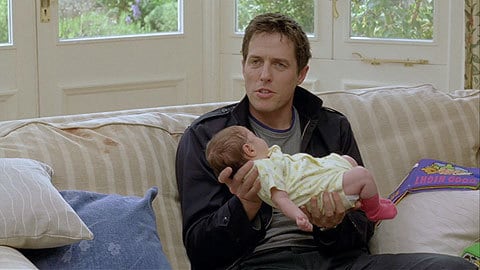
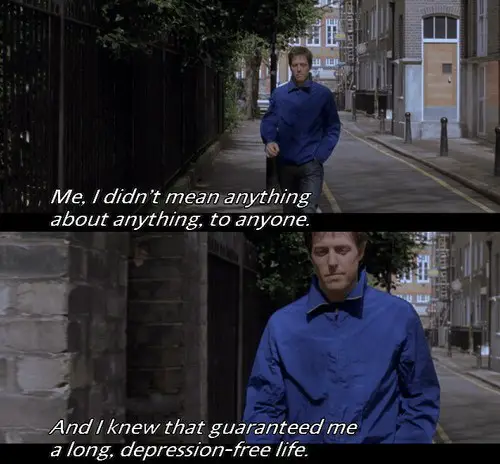
DESIRE
He wants a never-ending line of girlfriends who will dump him after a few weeks, so that he doesn’t have to dump them first and feel momentarily bad while watching them cry.
OPPONENT
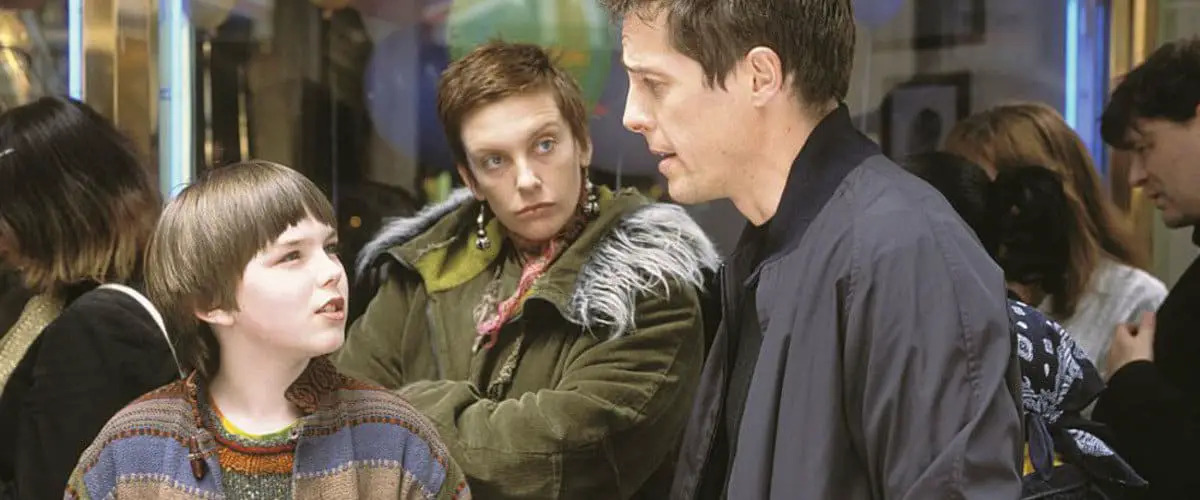
Marcus is the inverse of a trickster. What you see is what you get, to the point that he sings to himself, thinking he’s singing inside his head. Marcus is Will’s main opponent because it is Marcus who is onto Will straight away and has information that can get Will into a lot of bother, romantically.
Will also has a series of romantic opponents, and Marcus’s mother is a similar but non-romantic opponent as well, concerned in the welfare of her son.
FAKE OPPONENT ALLY
But it turns out that Marcus is not really an opponent.
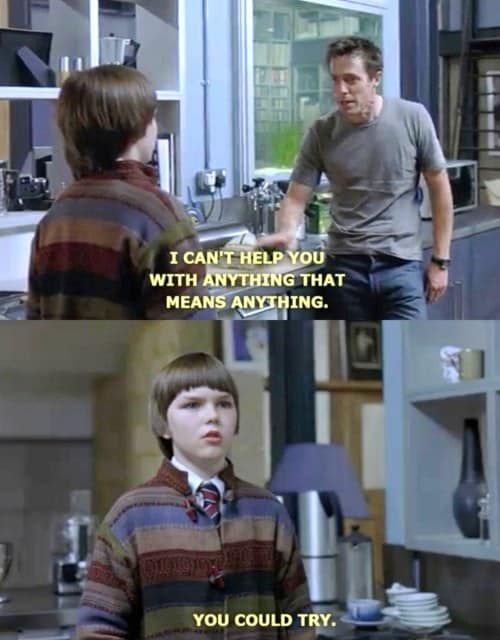
Though Will and Marcus appear to be opponents, they learn from each other by each of them becoming a little more like the other one.
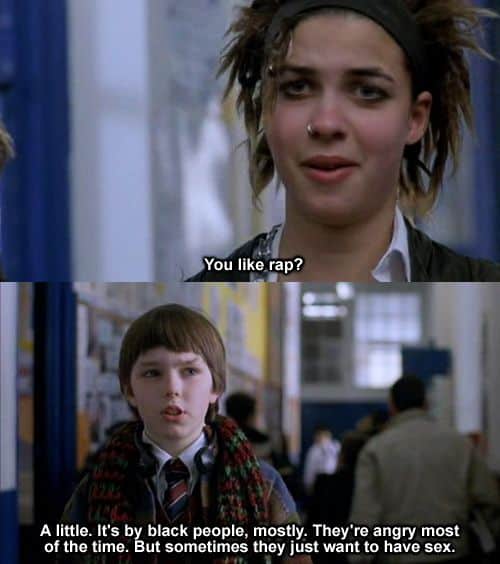
Marcus has his own fake opponent ally, Allie. (I find it really unusual for a work of fiction that one character in this is called Ellie and another, completely unrelated character, is called Ali.)
PLAN
Pretend to be a single father in order to ingratiate himself to single mothers, who will think he’s wonderful for coping so well. Since single mothers are so attached to others themselves, they won’t get too attached to him, which is perfect. Will therefore invents a two-year-old called Ned and attends meetings for single parents, which he sees advertised on a flyer.
BIG STRUGGLE
There are a number of big struggles, each taking place between Will and one of his opponents. For example, the mother he tried to shag, who has uncomfortably been invited to the same Christmas party, and the argument in the restaurant with Marcus’s mother. Then there is the important argument with Marcus himself:
ATTACK FROM ALLY
This is the part where the main character (or two main characters) have an argument with each other. This is an opportunity for the writer to let the audience know the basic philosophies of each. Both characters here have a solid and conflicting worldview, but Will is going to have to learn that he does need other people in order to be happy.
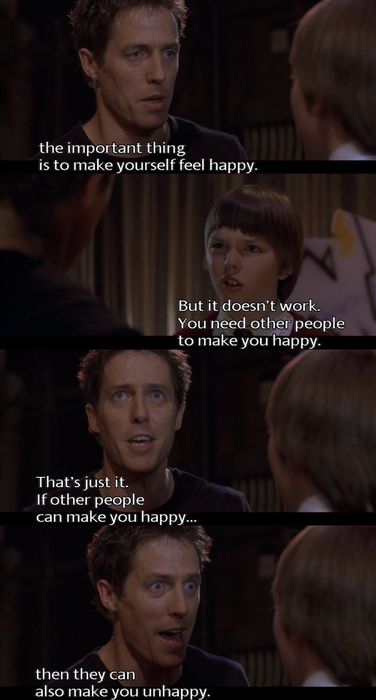
But the main big struggle scene takes place on stage. There’s a big lead up, with the ticking clock being used to increase dramatic tension. Will has to make it to the school on time to keep him from going on stage with his tambourine. He loses the race, so ends up on stage memorably singing Killing Me Softly on a guitar (Chekhov’s guitar, introduced much earlier when Marcus asks him if it’s just for show).
ANAGNORISIS
Three characters have a anagnorisis:
When Fiona suggests Marcus eat a McDonalds hamburger to celebrate his performance she is encouraging him to do something she herself disapproves of. We know that she has lessened her hold on her son and will let him make some more of his own decisions from now on.
We flash forward to the following Christmas. For the first time ever, Will is not hating it. He has realised he likes having people for company. Perhaps this new relationship with Rachel will really work.
Marcus has learned something too, from Will. He’s learnt to be just cool enough to fit in socially, but is still basically himself. His comment about Will’s shoes means he’s now giving thought to such things. After the concert Will has also advised that there’s no point trying to make other people happy because it’s not up to you whether someone else is happy or not. Likewise, it’s not your fault if another person is sad.
NEW SITUATION
This is a vital life lesson for Marcus to have learned, because of his mother’s ongoing depression.
FURTHER READING
About A Boy contains some scenes which a-spec viewers are likely to identify with, as explained at Ace Film Reviews.
